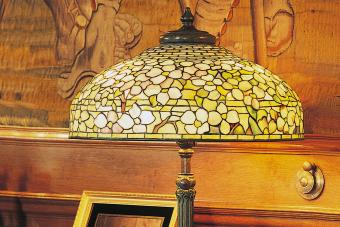
To the surprise of many novice collectors of musical instruments, antique mandolin harps are neither a mandolin nor a harp. Mandolin harps are actually members of the fretless zither family of musical instruments.
An Overview of Mandolin Harps
Manufactured in the very late part of the nineteenth century into the early years of the twentieth century, mandolin harps are a type of fretless chord zither. Like all fretless zithers, players can only play one note on each string since it has no fingerboard or frets. It is the fingerboard and the frets that allow players to finger different notes on the individual strings.
Mandolin harps, commonly known as American mandolin harps, had the unique feature of having small buttons in a panel over the strings called a gizmo. The idea behind the addition of the buttons was so players that had difficulty mastering the staccato picking or tremolo playing on a mandolin could get a similar effect on the chord-zither.
When a player pushes the button that coincided with the chosen melody string:
- A plectrum, which is a flat small tool like a pick, lowers down alongside of the string until it can make contact
- The button panel, which sits on two wooden rollers, is moved in the proper direction
- Then button panel is then moved rapidly back and forth
The Oscar Schmidt Company
The company instrumental in the development of the mandolin harp is the Oscar Schmidt Company of Jersey City, New Jersey. Although the company also had five factories throughout Europe, it was the Jersey City factory, founded in 1879, where the mandolin harp began.
Through the early part of the twentieth century Oscar Schmidt partnered with Friederich Menzenhauer, a well-known inventor of musical instruments including the guitar-zither, metallophone zither and harp cithern. Many of the existing early mandolin harps have the Menzenhauer & Schmidt labels attached.
Body Styles of Mandolin Harps
There are three basic body styles of mandolin harps:
- The earliest mandolin harps have a curved body style
- The bombe style body is similar to the early styles with a very wide curve on the left side
- The later body styles have straight lines
Finishes
The most common finishes found on mandolin harps are:
- Dark burgundy
- Black
- Silver
Inside Labels, Decals and Decorations
The label inside the soundhole of mandolin harps generally include:
- The model name
- Style designation
- Manufacturer name
- Manufacturer address
By the 1940s the Schmidt name was not usually found on the inside label. The name was replaced by one of the many names used by the company at the time.
soundhole decals:
- Swans
- Menzenhauer Harps
- Pearl chips
- Harps, mandolins, ribbons and scrolls
- Red international
- Music books
Soundboard decals and trim design decals:
- Tornado
- Filigree designs
- Groundstake
- Jamestown special
- Daisies
- Music books
- Admiral Dewey design
- Niagara Falls
- Red international
- Oriental looking designs
- Gilt rope and flowers
Examples of Mandolin Harps
- Oscar Schmidt from 1894
- 1900 Style B mandolin harp from Oscar Schmidt
- Mandolin harp from the 1904 St. Louis World's Fair
- Multiple images of Menzenhauer Schmidt mandolin harps with the first body style
- Examples of inside labels from Fretless Zithers
Where to Find Antique Mandolin Harps Online
Antique and vintage mandolin harps are often offered for sale from antique shops both on and off line, auction houses and online auctions such as eBay. The following is a small sampling of the many other online etailers that generally have these unique American musical instruments available:
Additional Information
Playing a Mandolin Harp
If you are a collector of old musical instruments, antique mandolin harps will make unique additions to your collection. However, if you looking for an antique musical instrument that is fun and easy to learn to play, chances are you will defiantly enjoy learning to play an antique or vintage mandolin harp.







